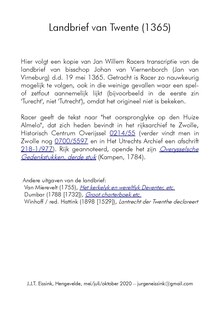Johann von Virneburg
John of Virneburg (* 13th or 14th century; † 23. June 1371 in Utrecht ) was chosen 1362/63 but not recognized papal archbishop of Cologne , as well as I. Johann 1363-1364 Bishop of Munster and as John V after Bishop from Utrecht .
Life
He came from the noble family Virneburg from the Eifel . His father was Robert III. from Virneburg . The rise of Johann was made possible by the provost and cathedral dean of the same name, Johann von Virneburg d. Ä. promoted. Like his uncle, the younger Johann became cathedral dean in Cologne .
Elected Archbishop of Cologne
After the death of Archbishop Wilhelm von Gennep , Cathedral Provost Wilhelm von Schleiden promoted the election of Johann von Virneburg as Archbishop. He was actually elected. Last but not least, the election of Count Gerhard von Virneburg and other relatives received financial support. However, part of the cathedral chapter did not agree with the election. These declared themselves for Bishop Engelbert von Liège . Both sides turned to the Pope in Avignon . Johann von Virneburg even appeared personally at the curia. But there was no decision because Innocent VI. had passed away. Johann returned to Cologne and continued to perform as an elect and his sumptuous lifestyle put a strain on the diocese's finances. He also gave away a significant portion of the church property to relatives.
Pope Urban V appointed Adolf von der Mark as archbishop instead of him . Instead, Johann became bishop of Münster in 1363, where Adolf had previously ruled. When Adolf took office in Cologne, he encountered resistance from Johann von Virneburg, who continued to see himself as the administrator of the archbishopric. Only after Adolf recognized the donations to Johann's relatives did Johann give in. So that the loss of the archbishopric was not too painful, the Pope was still entitled to the income of a Cologne cathedral dean for six years.
Bishop in Munster
In Münster he encountered resistance and was not up to the office. Little is known about his time there, except that he sold the disused bishop's palace at the cathedral for 100 marks. Instead, he was appointed Bishop of Utrecht by the Pope.
Bishop in Utrecht

From 1364 he was bishop in Utrecht. He did not succeed in asserting his authority as sovereign against the cathedral chapter, the nobility and the urban bourgeoisie. Since the first years of his reign there has been looting and pillage by aristocrats hostile to the bishopric. In 1368 he was captured at Goor Castle and only released for a large ransom. This forced him to mortgage rights and possessions, which in turn increased the diocese's debts. His reign was also overshadowed by external events. This includes the plague and devastating floods. After disputes with the cathedral chapter and Albrecht of Bavaria, he died unexpectedly in 1371. It is unclear whether he died of melancholy or poison.
In the Utrecht Cathedral he received a somewhat elaborate grave, of which no traces have been preserved.
literature
- Karl Theodor Wenzelburger: Johann V. van Virneburg . In: Allgemeine Deutsche Biographie (ADB). Volume 14, Duncker & Humblot, Leipzig 1881, p. 432 f.
- Wilhelm Kohl : The diocese of Münster . Volume 7: The Diocese . Walter de Gruyter, Berlin et al. 2003, ISBN 3-11-017592-4 , ( Germania sacra NF 37, 1: The Dioceses of the Church Province of Cologne ), pp. 159 f., 422 ff., Digitized .
| predecessor | Office | successor |
|---|---|---|
| Adolf III. from the mark |
Bishop of Münster 1363-1364 |
Florence from Wevelinghoven |
| John IV of Arkel |
Bishop of Utrecht 1364–1371 |
Arnold II of Horn |
| personal data | |
|---|---|
| SURNAME | Virneburg, Johann von |
| ALTERNATIVE NAMES | Johann I (Bishop of Munster) .; Johann V (Bishop of Utrecht) |
| BRIEF DESCRIPTION | elected Archbishop of Cologne, Bishop of Münster and Utrecht |
| DATE OF BIRTH | 13th century or 14th century |
| DATE OF DEATH | June 23, 1371 |
| Place of death | Utrecht |
